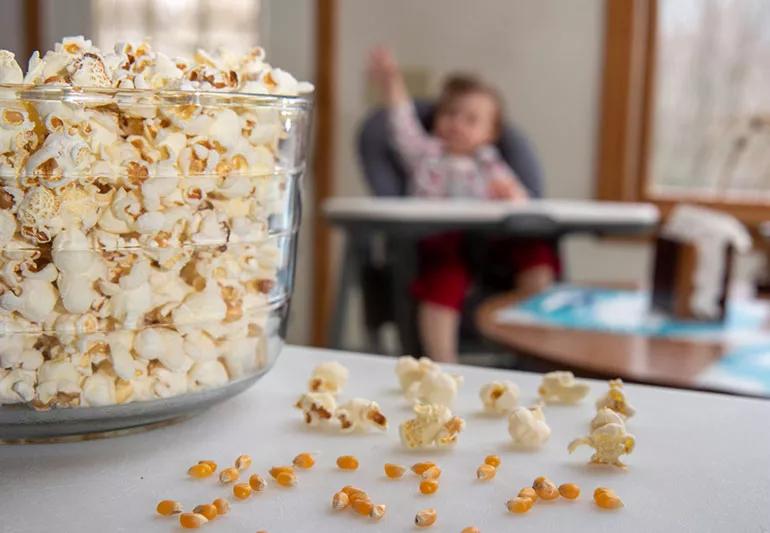A digestive disease expert explains

Image content: This image is available to view online.
View image online (https://assets.clevelandclinic.org/transform/09cce64d-8b5a-498c-93b1-855832aa0b4f/popcornKernalsChild-HEN-1872897-041020-770x533-1_jpg)
Child excited about eating popcorn
A: Popcorn is generally considered a healthy snack food, given all of the candy and high-fructose containing snacks on the market.
Advertisement
Cleveland Clinic is a non-profit academic medical center. Advertising on our site helps support our mission. We do not endorse non-Cleveland Clinic products or services. Policy
But be cautious when giving popcorn to kids — especially to very young children — due to the risk of choking. The American Academy of Pediatrics includes popcorn on its choking-risk list for children under age 4.
Older children and adolescents shouldn’t ingest large handfuls of the unpopped “old maid” kernels either. Besides being a choking hazard, crunching them can damage teeth. In severe cases, swallowing them can cause a mass collection in the intestinal tract, known as a “bezoar.” Small bezoars may pass on their own or with the help of medication, while sizeable ones may require surgery.
If your child develops abdominal pain after eating a large amount of unpopped kernels, call your pediatrician.
The bottom line: Don’t entice a young child with popcorn. And if you’re munching away, only eat those kernels that are fully popped.
— Pediatric gastroenterologist Deborah Goldman, MD
Advertisement

Sign up for our Health Essentials emails for expert guidance on nutrition, fitness, sleep, skin care and more.
Learn more about our editorial process.
Advertisement
Most teething symptoms are mild — fevers and other major symptoms are likely something else
Most babies will crawl between 7 and 10 months old, but later can be normal, too
Adding extra formula, cereal or medications to your baby’s bottle is a dangerous and misguided practice
Teaching your baby to sign may help ease frustrations before they can talk, but it’s not a must-do
Babies can get congested easily, but you can calm their cough by keeping them hydrated, using nasal drops and running a humidifier
Try to burp your baby mid-feed and after they finish eating — but don’t sweat it if they don’t burp
Most babies will recognize their name by about 9 months old
Clean your baby’s mouth with a washcloth or small toothbrush if they have a tooth or you suspect thrush
Although it could be used as a moisturizer, this new trend is not recommended
Communicating clear limits helps protect your time, energy and emotional well-being
High cholesterol can be genetic, but testing and treatment can lower your heart disease risk